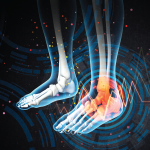
Chinnapong / shutterstock.com
Editor’s note: EULAR 2020, the annual European Congress of Rheumatology, which was originally scheduled to be held in Frankfurt, Germany, starting June 3, was moved to a virtual format due to the COVID-19 pandemic.
EULAR 2020 e-CONGRESS—Although reducing medications is a reasonable option for some patients with rheumatoid arthritis (RA)—reducing cost and giving them a sense of normalcy for at least some period of time—such a strategy is not always welcomed with open arms, an expert said at the European e-Congress of Rheumatology. Still, physicians should encourage patients to consider it, said Cornelia Allaart, MD, PhD, associate professor of rheumatology at Leiden University, The Netherlands.
“For so many years we’ve been looking at increasing drugs, getting more drugs, starting [drug therapy] earlier and improving outcomes by getting more and more, and now we’re talking about less and less,” Dr. Allaart said. “It’s a little bit of a new vista, but a very logical step.”
In two trials on drug tapering in which she’s been involved—the BeST trial, and another with a more aggressive initial treatment approach followed by tapering, called IMPROVED—the data suggest slowing or stopping medication administration is possible for many patients. But, Dr. Allaart said, a common hurdle is a patient’s anxiety.
“Most patients who are [concerned] about discontinuing their medication are dubious because they fear the flares,” Dr. Allaart said. They also worry that if they stop and then have to restart drug therapy, they’ll have lost ground they’ll never regain in the management of their condition.
Before tapering or stopping medications, rheumatologists need to have “a good conversation” with patients, letting them know that you’re only considering it because they are faring well, with low disease activity.
Why Stop Therapy?
The first, most obvious reason to consider stopping medications is to reduce adverse events. The risk of serious infections has been found to correlate with the prolonged use of glucocorticoids. Other serious side effects of glucocorticoids and other medications, such as biologic disease-modifying anti-rheumatic drugs, may include gastrointestinal bleeds, ulcers, cataracts, edema in the legs, bone fractures and sleep disturbances.1
The data suggest that slowing & stopping medication administration is possible for many patients. But, Dr. Allaart said, a common hurdle is a patient’s anxiety.
Based on the available evidence, however, reducing these events should not be the prime motivation when considering slowing a patient’s medications, Dr. Allaart said.
“These risk factors may entice us to try and taper medications,” she said. “But there’s no proof this will actually lower your risk of infections, … cardiovascular [events]” or other adverse events.
“So why discontinue?” she asked.
A major consideration is that these medications can be very expensive and stopping them, without adverse effects, makes financial sense.
Without Adverse Effects
In the BeST study, patients treated with infliximab who had achieved a disease activity score (DAS) of 2.4 or less fared better than those who did not achieve that benchmark when the drug was stopped.2 Overall, 58% were able to have an infliximab-free holiday of more than a year. Rapid improvement with the first course of infliximab, being a non-smoker and the absence of anti-citrullinated protein antibodies was a combination that favored a prolonged drug-free period.
Dr. Allaart said that, in general, predicting which patients may be able to remain off medication for an extended period of time is difficult. You can look at this positively, she said, because “it means you can try it in everyone.”
Overall, 50 of 104 patients in the study had to restart infliximab after a median of 17 months off the therapy. Among those patients, 84% regained a DAS of less than 2.4 within about three months. Researchers saw no difference between those who were started on infliximab initially and those who had a delayed start, Dr. Allaart said.
Subsequent studies have found those who experienced flares had worse immediate scores on the Health Assessment Questionnaire, a measure of disability, and were more likely to go on to have radiographic progression.3 But this was not necessarily linked with drug tapering, she said.
“We clearly saw that the minority of flares was preceded by a tapering effort,” she said. “So [flares] can occur at any time and [were] not clearly a result of our tapering effort.”
In the IMPROVED study, another strategy trial involving drug stoppages in certain patients, higher doses of methotrexate and prednisone were given to bring on low-
disease activity as quickly as possible.4 As soon as patients had a DAS of 1.6, researchers began tapering drugs. More patients in the IMPROVED study achieved remission and drug-free remission than those in the BeST study, Dr. Allaart said, suggesting that setting an aggressive treatment goal yields benefits in terms of the ability to stop medications.
An “earlier, more aggressive target results in better drug-free remission,” she said.
In Sum
The prevailing picture painted by the data should encourage physicians and patients to slow and stop medication when a patient’s RA has been well controlled for a long period of time, Dr. Allaart said.
“We are treating our patients [so they can lead] as normal lives as possible,” Dr. Allaart said. “And as normal as possible includes taking as [few] medications as possible.”
Monitoring these patients is essential, especially once drugs are stopped.
Physicians should “keep our office doors open, to say to our patients, ‘As soon as you think that you are losing your drug-free remission, as soon as you feel you’re deteriorating, you have access to me. I can see you,’” Dr. Allaart concluded.
Thomas R. Collins is a freelance writer living in South Florida.
References
- George M, Baker J, Winthrop K, et al. Risk of serious infection with long-term use of low-dose glucocorticoids in patients with rheumatoid arthritis [abstract 848]. Arthritis Rheumatol. 2019;71(suppl 10).
- Allaart CF, Breedveld FC, Dijkmans BAC, et al. Treatment of recent-onset rheumatoid arthritis: Lessons from the BeSt study. J Rheumatol Suppl. 2007 Nov;80:25–33.
- Markusse IM, Dirven L, Gerards AH, et al. Disease flares in rheumatoid arthritis are associated with joint damage progression and disability: 10-year results from the BeSt study. Arthritis Res Ther. 2015 Aug 31;17(1):232.
- Heimans L, Wevers-de Boer KVC, Visser K, et al. A two-step treatment strategy trial in patients with early arthritis aimed at achieving remission: The IMPROVED study. Ann Rheum Dis. 2014 Jul;73(7):1356–1361.

